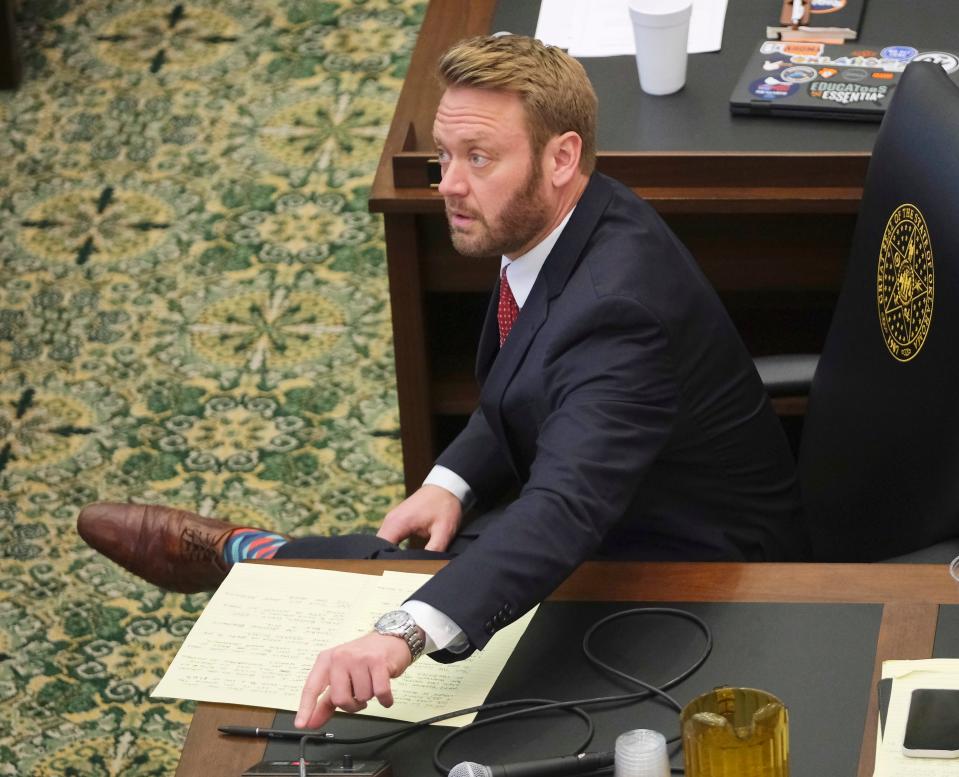It's been nearly 10 years since lawmakers last addressed civil asset forfeiture. Gov. Stitt has asked for change
- Oops!Something went wrong.Please try again later.
- Oops!Something went wrong.Please try again later.
- Oops!Something went wrong.Please try again later.
It's been tried before.
Almost a decade ago, a Republican state lawmaker partnered with the Oklahoma branch of the American Civil Liberties Union and the Oklahoma Council of Public Affairs to try and reform the state's civil asset forfeiture system.
They didn't get far.
County sheriffs and the state's district attorneys pushed back against the idea. And though one bill — limited in scope — became law in 2016, not much has been done since then.
Fast-forward to this week. Reforming the civil asset forfeiture system is back on the table after Gov. Kevin Stitt challenged state lawmakers to make changes during his State of the State speech.
"We need to address civil asset forfeiture," the governor said Monday. "It’s crazy to me that somebody can be pulled over and have their cash and truck taken for an alleged crime, get acquitted of that crime, but they still never get their property back. That isn’t fair and we need to make sure it isn’t happening anywhere in Oklahoma."

Oklahoma lawmakers say they're unclear on details of any new plan to change civil asset forfeiture
Stitt's call to change the system caught many state lawmakers off guard.
Speaking at a news conference after the governor's speech Monday, Senate Pro Tempore Greg Treat said he was surprised Stitt raised the subject. "That's an issue that former Sen. Kyle Loveless talked about a lot when he was here," Treat said. "I remember the blowback that he received from law enforcement, so I actually was trying to look at (Public Safety Commissioner Tim) Tipton to see what his reaction was."
But Treat, R-Oklahoma City, said those residents who had assets seized and were later not found guilty should have those assets returned.
"The way we do that, the way we go about it, it's a very complicated process," he said. "The governor, there's just a lot of issues that he brought up today, issues that we as the Senate have not talked to the governor (about). I don't know any details about what he's trying to accomplish. I don't know all the ins and outs."
But Treat said that, philosophically, the government should be required to have "a very good case against someone" and prove guilt in order to take away property.
"But I'm not well versed on this, so I'm gonna have to educate myself," he said.

Last move to change Oklahoma's procedures for asset forfeiture nearly 10 years ago
Records released by the ACLU of Oklahoma in 2015 showed at that time, over a five-year period, law enforcement officials in 12 Oklahoma counties seized more than $6 million in cash, almost $4 million of which was taken without any criminal charges. In addition, of the $6.1 million dollars taken, only $2.1 million was seized from people who were actually charged with a crime.
According to the ACLU's report, Canadian county law enforcement officials took $2,733,956.88 in cash in 44 seizure cases. However, of those 44 cases, court records show that criminal charges were only filed in 23.
In 2016, then-Gov. Mary Fallin, a Republican, signed a bill that gave judges the authority to award attorney fees to people whose assets were unjustly seized by law enforcement. Since, then, however, efforts to change the forfeiture process have been dormant.On Monday, Loveless, the former senator from Oklahoma City, said he applauded Stitt's calls for changes to the system, but added that the governor and reform supporters would have difficulty getting a bill through both houses of the Legislature this year.
"I appreciate that he raised the subject," Loveless said. "But I think it would be hard to get done."
Loveless isn't the only one. State Rep. Justin Humphrey, chair of the House's Criminal Justice and Corrections Committee, said he doubted too many lawmakers wanted to tangle with the District Attorneys Council during an election year.
"There's a conversation to be had about it, but it's hard to get things moving up here," Humphrey, R-Lane, said. "The problem is that the DAs Council has had a very tight hold on things up here. I support the DAs 1,000 percent but I've also disagreed with them."
In 2015, the state's district attorneys waged a session-long fight to defeat the reform measure. At that time they said forfeiture is necessary to combat drug trafficking and that abuses of the system were rare. Cleveland County DA Greg Mashburn told Oklahoma Watch in 2015 that Loveless "was hyping the issue and using scare tactics to push his bill."
“I’m very concerned that’s the line he’s taking in that,” said Mashburn in the article. Mashburn, both then and now, represents Cleveland, Garvin and McClain counties and sits on the commission overseeing the Oklahoma State Bureau of Narcotics and Dangerous Drugs. In 2015 he said civil forfeiture "may be something we need to address at our next quarterly (commission) meeting, just to stay on top of it, because it’s going to be an issue that we need to address and educate people on. They’re telling scary stories on the other side, and it’s just not accurate."
The Oklahoman made numerous requests for comments from the state's District Attorneys Council about its opposition to changes in the forfeiture system but did not receive a response.
House Democrats call changing civil asset forfeiture 'a bipartisan issue'
While the Republican-controlled Legislature may be hesitant to embrace the governor's call, Democrats in the House of Representatives said they agree with Stitt.
"It's a bipartisan issue," state Rep. Mickey Dollens, D-Oklahoma City, said. "We haven't whipped a vote in the caucus, but Democrats are supportive of changes. It all comes down to fairness."

Still, even though no legislation has been filed to date, Humphrey predicted the discussion about the issue over civil asset forfeiture would continue. "People are gonna keep talking about it," he said. "The governor raised the issue and there will be discussions about it this year."
This article originally appeared on Oklahoman: Oklahoma Gov. Kevin Stitt wants civil asset forfeiture reform

